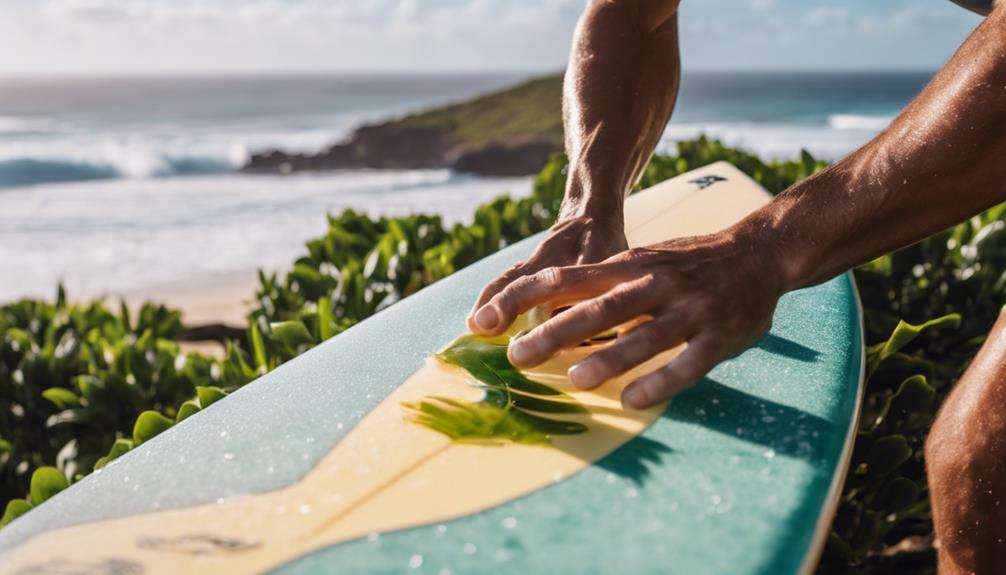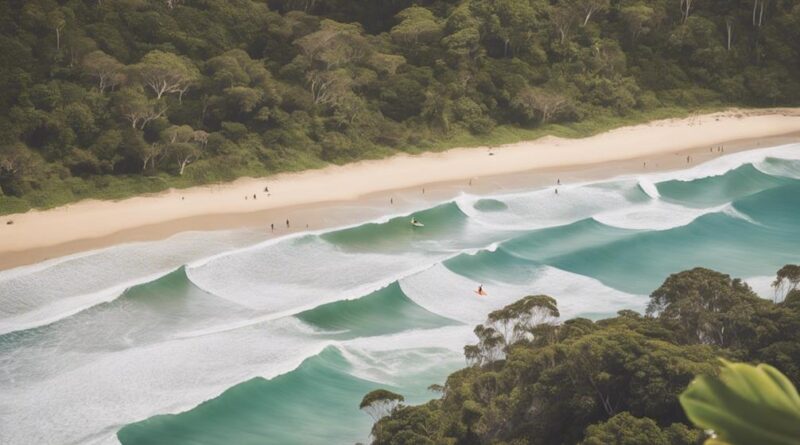Sustainable Surfing Adventures in Australia Uncovered
Explore a different side of surfing down under with a focus on sustainable practices that go beyond just catching waves.
Discover how Australia's stunning coastline is not only a playground for surfers but also a hub for eco-conscious initiatives that aim to protect the oceans and marine life.
From innovative surf camps that prioritize environmental conservation to unique experiences that blend adventure with sustainability, you'll soon realize that there's more to these surf adventures than meets the eye.
Best Eco-Friendly Surf Camps
When searching for the best eco-friendly surf camps in Australia, consider their sustainability practices and environmental impact. Look for eco-friendly accommodation options that prioritize minimizing their carbon footprint and reducing waste. These surf camps may offer accommodations made from recycled or sustainable materials, utilize renewable energy sources, and implement water-saving initiatives to protect the surrounding environment.
In addition to eco-friendly accommodations, sustainable transportation solutions are also crucial when choosing a surf camp. Opt for camps that promote alternative transportation methods such as cycling, walking, or using electric vehicles to reduce greenhouse gas emissions. Some eco-friendly surf camps may even provide shuttle services from nearby public transportation hubs to minimize the use of individual cars.
Organic Surfboard Rentals
Consider elevating your sustainable surfing experience by opting for organic surfboard rentals at eco-friendly surf camps in Australia. When choosing organic surfboard rentals, you not only reduce your environmental impact but also support businesses that prioritize eco-conscious practices.
Here are a few reasons why organic surfboard rentals can enhance your surfing adventures:
- Environmentally Friendly Materials: Organic surfboards are typically made from sustainable materials such as bamboo or recycled foam, reducing the use of harmful chemicals and minimizing carbon footprint.
- Biodegradable Boardshorts: Pairing your organic surfboard rental with biodegradable boardshorts adds another layer of sustainability to your surfing experience. These boardshorts are designed to break down naturally, reducing plastic pollution in the oceans.
- Ocean Friendly Sunscreen: To complement your eco-friendly gear, opt for ocean-friendly sunscreen to protect your skin without harming marine life. Look for mineral-based sunscreens that are free of oxybenzone and octinoxate, which are harmful to coral reefs.
- Supporting Sustainable Practices: By choosing organic surfboard rentals, you're supporting businesses that prioritize sustainability and environmental conservation. Your decision contributes to the promotion of eco-friendly practices within the surfing industry, encouraging others to follow suit.
Sustainable Beach Clean-Up Initiatives
To enhance your sustainable surfing adventures in Australia, engage in sustainable beach clean-up initiatives that promote environmental conservation and protect marine ecosystems. By participating in community collaboration efforts aimed at tackling marine debris, you can actively contribute to the preservation of Australia's stunning coastal areas.
These beach clean-up initiatives not only help in maintaining the beauty of the beaches but also play a crucial role in safeguarding marine life. Marine debris, such as plastic waste and other pollutants, pose a significant threat to the delicate balance of marine ecosystems. Engaging in clean-up activities allows you to directly mitigate this threat and protect the diverse marine species that call these waters home.
Through community collaboration, you can join forces with like-minded individuals who share a passion for environmental conservation. By working together towards a common goal, the impact of these initiatives is amplified, leading to more effective outcomes in reducing marine debris and promoting sustainable practices along the coastline.
As you participate in sustainable beach clean-up initiatives, you not only make a positive difference in the environment but also cultivate a deeper connection to the marine ecosystems you enjoy during your surfing adventures. Take the opportunity to contribute to the preservation of Australia's coastal treasures and be a steward of the oceans for future generations to come.
Carbon-Neutral Surfing Lessons
Engage in carbon-neutral surfing lessons to minimize your environmental impact while enjoying the waves in Australia. By choosing eco friendly surfboards made from sustainable materials and powered by renewable energy sources, you can surf with a clear conscience, knowing you're reducing your carbon footprint.
Here's how you can make your surfing adventures more sustainable:
- Eco-Friendly Surfboards: Opt for surfboards made from recycled materials or sustainable sources to lessen the environmental impact of your gear.
- Renewable Energy: Select surf schools that operate using renewable energy sources such as solar or wind power to reduce the carbon emissions associated with your lessons.
- Carbon Offsetting: Consider participating in carbon offsetting programs that help neutralize the greenhouse gas emissions generated by your surfing activities.
- Eco-Conscious Transportation: Choose environmentally friendly modes of transportation, such as biking or public transit, to get to your surfing lessons and reduce your overall carbon footprint.
Wildlife Conservation in Surfing Areas
As you enjoy your carbon-neutral surfing lessons in Australia, it's crucial to be mindful of the wildlife conservation efforts in these surfing areas. Marine protection plays a significant role in ensuring the preservation of Australia's unique marine ecosystems. Many surfing spots are located near sensitive marine habitats, such as coral reefs and seagrass beds, which are crucial for the survival of various marine species. By supporting marine protection initiatives and being aware of the impact of surfing activities on these ecosystems, you can contribute to the long-term health of the marine environment.
Biodiversity preservation is another key aspect of wildlife conservation in surfing areas. Australia is home to a wide range of marine species, including dolphins, turtles, and various fish species. Surfing in these areas means sharing the ocean with these creatures, making it essential to respect their habitats and minimize disturbances. Responsible surfing practices, such as avoiding sensitive areas and following designated surfing zones, can help protect the biodiversity of these regions.
Locally-Sourced Surfing Gear
Supporting sustainable surfing adventures in Australia involves utilizing locally-sourced surfing gear to minimize environmental impact. By opting for eco-friendly wetsuits and sustainable sunscreen, you can reduce the use of harmful chemicals that can harm marine life and coral reefs. Additionally, choosing recyclable surfboard fins helps decrease plastic pollution in the oceans, while using biodegradable surfboard leashes ensures that if lost or discarded, they'll break down naturally without leaving a lasting impact on the environment.
To further enhance your eco-conscious surfing experience, consider the following locally-sourced options:
- Eco-Friendly Wetsuits: Look for wetsuits made from sustainable materials like limestone neoprene or recycled fabrics, which have a lower carbon footprint compared to traditional neoprene suits.
- Sustainable Sunscreen: Opt for reef-safe sunscreens that are free from oxybenzone and octinoxate, chemicals known to harm coral reefs and marine life.
- Recyclable Surfboard Fins: Choose fins made from recycled materials that can be recycled again at the end of their life cycle, reducing the amount of plastic waste in the environment.
- Biodegradable Surfboard Leashes: Select leashes made from biodegradable materials like natural rubber or recycled plastics, which decompose over time, minimizing the impact on the ecosystem.
Eco-Conscious Surfboard Wax

Consider using eco-conscious surfboard wax to minimize your environmental impact while enjoying sustainable surfing adventures in Australia. Opting for eco-conscious surfboard wax means choosing a product that isn't only better for the environment but also effective in providing the needed grip for your surfboard.
Many eco-conscious surfboard waxes come in biodegradable packaging, reducing plastic waste that could harm marine life if not disposed of properly. By selecting wax with biodegradable packaging, you contribute to keeping Australia's coastal areas clean and pristine.
Additionally, some eco-conscious surfboard wax brands prioritize sustainability by utilizing renewable energy sources in their production processes. This commitment to renewable energy helps reduce the carbon footprint associated with manufacturing surfboard wax, making your surfing endeavors more environmentally friendly. Supporting brands that harness renewable energy showcases your dedication to sustainability and encourages other companies to follow suit, fostering a more eco-conscious surfing community overall.
When shopping for surfboard wax, look for options that not only cater to your surfing needs but also align with your environmental values. Making small changes, such as switching to eco-conscious wax, can collectively make a significant positive impact on the environment, allowing you to enjoy the waves guilt-free during your surfing adventures in Australia.
Responsible Surfing Tour Operators
To enhance your sustainable surfing experience in Australia, seek out responsible surfing tour operators that prioritize environmental conservation and community engagement. Choosing operators that value ethical surfboard manufacturing and disposal practices not only reduces your environmental impact but also supports the local community's well-being. Look for tour operators that actively engage with the community and work towards cultural preservation, ensuring that your surfing adventures contribute positively to the areas you visit.
When selecting a surfing tour operator in Australia, consider the following:
- Ethical Surfboard Manufacturing: Opt for operators that use sustainable materials and methods in crafting surfboards to minimize ecological harm.
- Ethical Surfboard Disposal: Choose operators that have proper disposal strategies in place to ensure old surfboards are recycled or disposed of responsibly.
- Community Engagement: Support operators that give back to the local community through various initiatives, such as beach clean-ups or educational programs.
- Cultural Preservation: Select operators that respect and protect the cultural heritage of the regions you visit, ensuring that surfing activities don't negatively impact local traditions or sites.
Frequently Asked Questions
What Are Some Tips for Reducing Waste and Plastic Usage While on a Surfing Adventure in Australia?
When on a surfing adventure in Australia, reducing waste and plastic usage is crucial. To help the environment, opt for eco-friendly sunscreen and carry a reusable water bottle.
These simple swaps can make a big difference in protecting the oceans and beaches you love to explore. By being mindful of your choices, you can enjoy your surfing adventure while minimizing your environmental impact.
How Can Surfers Contribute to Protecting Marine Life and Ecosystems During Their Time in the Water?
To protect marine life and ecosystems during your time in the water, you can make a difference. Participate in beach cleanups and support marine conservation efforts.
Use sustainable sunscreen and opt for eco-friendly gear to reduce your impact on the environment. By taking these steps, you can help preserve the beauty of the oceans and ensure a healthier future for marine life.
Are There Any Unique Ways That Surfers Can Support Indigenous Communities and Cultural Heritage in Surfing Areas?
Supporting indigenous communities and cultural heritage in surfing areas can be done through community engagement and cultural exchange.
By participating in local events, buying from indigenous vendors, and learning about the history of the area, you can show your respect and appreciation for the communities that call these places home.
This not only enriches your surfing experience but also helps preserve the traditions and stories that make these places special.
What Steps Can Surfers Take to Minimize Their Carbon Footprint While Traveling to and From Surfing Destinations?
To minimize your carbon footprint when traveling to surf spots, opt for eco-friendly transportation like buses or trains. Consider supporting carbon offsetting initiatives to balance out your emissions.
These steps can help reduce the environmental impact of your journeys and contribute to a more sustainable surfing lifestyle. By choosing greener travel options, you can enjoy your surfing adventures while being mindful of the planet's well-being.
How Can Surfers Support and Promote Sustainable Tourism Practices Within the Surfing Industry in Australia?
To support and promote sustainable tourism practices within the surfing industry in Australia, you can start by choosing eco-friendly surfboards and sustainable surfwear.
Engage in community partnerships that focus on environmental education. By actively participating and advocating for these initiatives, you can help create a more sustainable surfing culture in Australia.
Your choices and actions have the power to make a positive impact on the environment and the surfing industry as a whole.
Conclusion
You've now discovered the many ways you can enjoy sustainable surfing adventures in Australia.
From eco-friendly surf camps to organic surfboard rentals and beach clean-up initiatives, there are plenty of options for environmentally conscious surfers.
By supporting local initiatives, choosing eco-conscious gear, and participating in wildlife conservation efforts, you can enjoy the waves while also protecting our oceans and beaches for future generations.
Happy surfing!
